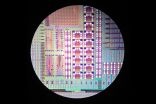Ultra-sensitive sensor detects individual electrons
2015-04-23
(Press-News.org) A Spanish-led team of European researchers at the University of Cambridge has created an electronic device so accurate that it can detect the charge of a single electron in less than one microsecond. It has been dubbed the 'gate sensor' and could be applied in quantum computers of the future to read information stored in the charge or spin of a single electron.
In the same Cambridge laboratory in the United Kingdom where the British physicist J.J. Thomson discovered the electron in 1897, European scientists have just developed a new ultra-sensitive electrical-charge sensor capable of detecting the movement of individual electrons.
"The device is much more compact and accurate than previous versions and can detect the electrical charge of a single electron in less than one microsecond," M. Fernando González Zalba, leader of this research from the Hitachi Cambridge Laboratory and the Cavendish Laboratory, tells SINC.
Details of the breakthrough have been published in the journal Nature Communications and its authors predict that these types of sensors, dubbed 'gate sensors', will be used in quantum computers of the future to read information stored in the charge or spin of a single electron.
"We have called it a gate sensor because, as well as detecting the movement of individual electrons, the device is able to control its flow as if it were an electronic gate which opens and closes," explains González Zalba.
The researchers have demonstrated the possibility of detecting the charge of an electron with their device in approximately one nanosecond, the best value obtained to date for this type of system. This has been achieved by coupling a gate sensor to a silicon nanotransistor where the electrons flow individually.
In general, the electrical current which powers our telephones, fridges and other electrical equipment is made up of electrons: minuscule particles carrying an electrical charge travelling in their trillions and whose collective movement makes these appliances work.
However, this is not the case of the latest cutting-edge devices such as ultra-precise biosensors, single electron transistors, molecular circuits and quantum computers. These represent a new technological sector which bases its electronic functionality on the charge of a single electron, a field in which the new gate sensor can offer its advantages.
INFORMATION:
References:
M. F. Gonzalez-Zalba, S. Barraud, A. J. Ferguson, A. C. Betz. "Probing the limits of gate-based charge sensing". Nature Communications, 6: 6084, 2015. Doi:10.1038/ncomms7084
[Attachments] See images for this press release:

ELSE PRESS RELEASES FROM THIS DATE:
2015-04-23
How long is the way from the city hall to the train station? When we estimate distances, something curious happens: short distances seem longer, and long distances shorter than they really are. Similar biases occur during judgments of volume, brightness or time. Psychologists call this phenomenon Vierordt's law. Its independence of the involved sensory systems suggests that our brain possesses universal principles for the assessment of physical quantities. However, where do the characteristic estimation biases stem from? In collaboration with colleagues from Zurich, neuroscientists ...
2015-04-23
It's a common dilemma faced by many working parents: your child has a cough or a cold, do you send them to nursery?
Researchers from the University of Bristol have, for the first time, investigated the process of decision-making that parents go through when faced with this situation. The research, published in The Journal of Public Health, reports that parents viewed coughs and colds as less serious and not as contagious as sickness and diarrhoea symptoms.
This resulted in many parents sending their child to daycare with a respiratory tract infection (RTI), which can ...
2015-04-23
In response to an article published by Chinese scientists describing research that used gene editing technologies in human embryos, the International Society for Stem Cell Research (ISSCR) has again called for a moratorium on attempts at human clinical germline genome editing while extensive scientific analysis of the potential risks is conducted, along with broad public discussion of the societal and ethical implications. The research article, entitled "CRISPR/Cas9-mediated Gene Editing in Human Tripronuclear Zygotes," was published online on April 18 in the scientific ...
2015-04-23
Imagine a day when scientists are able to alter the DNA of organisms in the lab in the search for answers to a host of questions. Or imagine a day when doctors treat genetic disorders by administering drugs designed to alter a patient's genome.
It may sound like science fiction, but with the development of genome-editing proteins like Cas9 and CRISPR, it could one day become science fact.
Before that happens, however, scientists must overcome a number of challenges, including how to improve the specificity of these proteins- the rate at which genome-editing proteins ...
2015-04-23
A more intellectually demanding job may be the key to living longer after developing young-onset dementia, according to health researchers.
Degeneration of the frontal and temporal parts of the brain leads to a common form of dementia affecting people under the age of 65. It results in changes in personality and behavior and problems with language, but does not affect memory.
"[Our] study suggests that having a higher occupational level protects the brain from some of the effects of this disease, allowing people to live longer after developing the disease," said Lauren ...
2015-04-23
An international team of scientists is calling for urgent and temperature patterns in mountain regions after compiling evidence that high elevations could be warming faster than previously thought.
Without substantially better information, people risk underestimating the severity of a number of already looming environmental challenges, including water shortages and the possible extinction of some alpine flora and fauna, according to the research team, which includes Henry Diaz and Imtiaz Rangwala from CIRES, the Cooperative Institute for Research in Environmental Sciences ...
2015-04-23
Shetland ponies' immune response to insect bites is helping scientists understand how people could be prevented from developing allergies.
The horse immune system can respond to midge bites in a way that prevents - rather than triggers - allergic reactions, researchers say.
The ponies' immune response to midge bites is similar to what happens in people with allergies, the team says. Understanding what triggers allergic reactions could help researchers come up with ways to stop people developing sensitivities.
It was previously thought that ponies which do not suffer ...
2015-04-23
April 23, 2015, Vienna, Austria: A drug approved to treat type 2 diabetes could prove to be a powerful new treatment option for non-alcoholic steatohepatitis (NASH), according to research presented today at The International Liver CongressTM 2015. Results from a randomised controlled trial showed liraglutide met the primary endpoint of histological clearance of NASH, and a reduction in the progression of fibrosis. The research was supported by the Wellcome Trust and the NIHR.
In the Liraglutide Efficacy and Action in NASH (LEAN) trial, overweight patients with biopsy-confirmed ...
2015-04-23
April 23, 2015, Vienna, Austria: Phase III results revealed today at The International Liver Congress™ 2015 show that once-daily treatment with daclatasvir (DCV) plus sofosbuvir (SOF) resulted in an overall 97% sustained virologic response (SVR) at 12 weeks post-treatment in patients with hepatitis C virus (HCV) and HIV co-infection, including cirrhotic patients.
HIV co-infection more than triples the risk of hepatitis C-related liver disease, liver failure and liver-related death. Co-infection can also complicate the management of HIV infection.
In the ALLY-2 ...
2015-04-23
April 23, 2015, Vienna, Austria: A new study presented today at The International Liver Congress™ 2015 shows that by using genomic analyses to understand how and when carcinogenic mutations occur in patients with hepatocellular carcinoma (HCC), it is possible to identify specific molecular profiles. It is hoped that these molecular profiles will help identify which patients would benefit from specific anticancer treatments.
Using exome sequencing - a technique for sequencing all the protein-coding genes in a genome - the study identified relationships between environmental ...
LAST 30 PRESS RELEASES:
[Press-News.org] Ultra-sensitive sensor detects individual electrons


